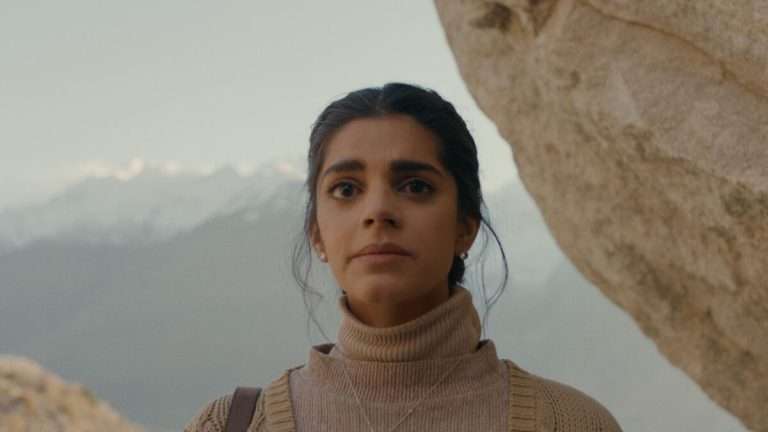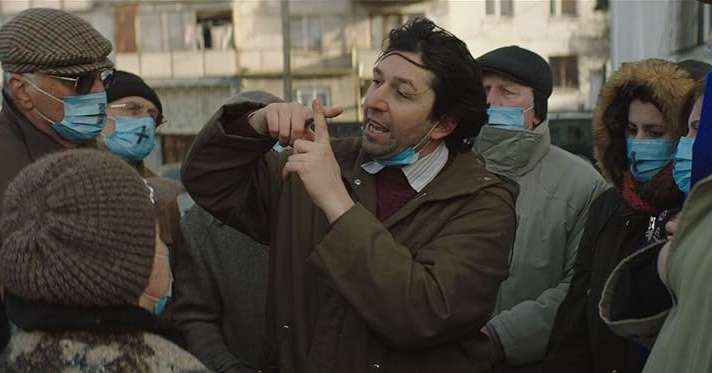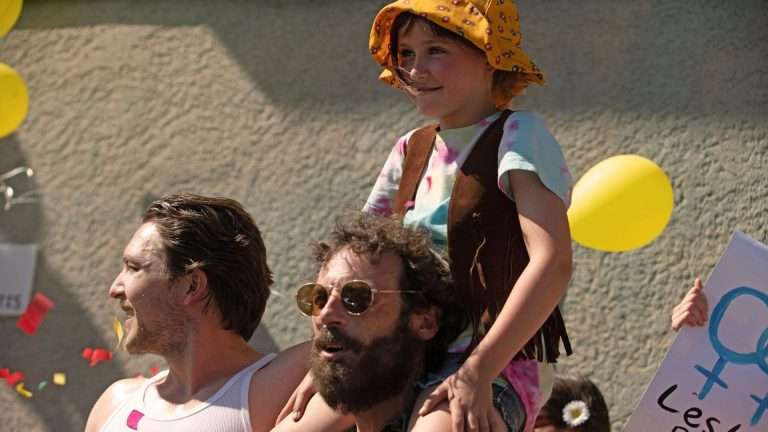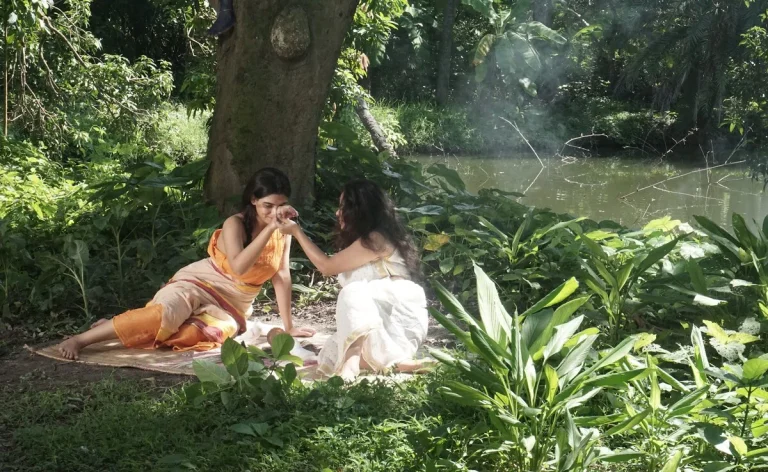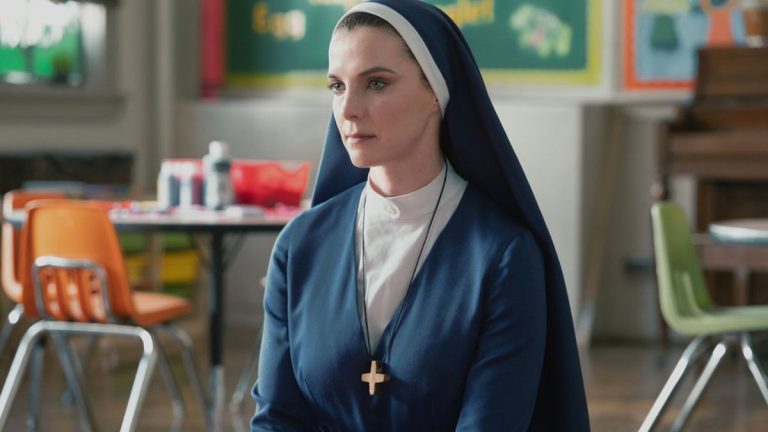Karan Tejpal’s debut feature “Stolen” is currently streaming on Amazon Prime. It’s a breathtaking survival thriller that will leave you awestruck and, at times, might even make you grip the edge of your seat. But it doesn’t merely entertain as a fictional drama; it explores the underbelly of our society and highlights complex issues such as illegal surrogacy, etc. And as one of the most political films in recent memory, ‘Stolen’ portrays the confrontation of two Indias.
Today, I had the pleasure of having a conversation with the film’s director, Karan Tejpal, its producer, Gaurav Dhingra, and the one and only Abhishek Banerjee, who played the character of Gautam Bansal. The socially and politically conscious cast and crew touched on multiple complex issues, both within the film industry, the festival circuits, and in society at large. Like “Stolen” itself, their answers were bold and valiant. I hope you enjoy the conversation.
Soumalya Chatterjee: “Stolen” premiered at multiple film festivals, where it was naturally screened on the big screen. So, you already have the experience of witnessing live audience reactions inside a theatre. But the film was eventually released on Amazon Prime. While watching it, I constantly felt somewhat excluded from the experience of seeing it on the big screen. Given the film’s technical aspects, one is bound to feel that it would have hit differently if released in theatres. The issue with OTT platforms is that people watch films comfortably at home, and you never get the chance to witness live reactions coming from different kinds of audiences. Can you share your thoughts on this? Do you see it as a problem? And how do you perceive this neo-relationship between filmmakers and audiences in the time of OTTs?
Abhishek: Yes, I have seen that reaction you’re talking about, and it was amazing. The way people were reacting at MAMI felt like the first Friday show of a newly released blockbuster film. But see, when we were making this film, we were pretty sure that we wanted to make an entertaining, engaging film. But see, there’s a tag for films that go to festivals. The audience also feels that these films are niche and not meant for common consumption. So there’s a big risk in releasing these films in theatres because we don’t know how the audience is going to react. But I also think that this is the first time in many years that an indie film is getting this kind of response from the masses.
Usually, festival entries guarantee you good reviews, and you see important people talking about the film, but this time, people—both in India and globally—are really watching it. You know, I was shooting in Bhopal, and somebody came to me and said his elder brother had watched Stolen. So I feel this is a new beginning for independently made films to enmesh with the mainstream scenario.
Of course, we want to release our films in theatres, but see, we don’t know what would have happened if we had released the film in, say, 300-400 theatres. Then we would have had to rely on the guessing game. But because of one platform, the film is getting so much response from the masses. So I think for films like this, OTT is a saviour, where it guarantees you the existence of an audience. Now, whether they are going to watch it or not depends completely on the product. You can’t force them to watch anything.
Gaurav: I can say one thing for sure: whether we are writers, directors, or producers, we all want to see our films on the big screen. It’s a dream that all of us have. Now, you need to understand the economics behind it. For Stolen, we invested a lot of money to reach the Hindi market, which is primarily situated in the northern part of the country. And, this region is not as economically robust as the southern part. For example, ticket prices are much higher in the north India than in the south. So, gaining a profit from your investment is very tough in the current ecosystem of Hindi cinema.
That’s why, to make a profit, you always need a big star in your film along with a strong opening weekend. We also need to understand who this ‘star’ really is. He is an influencer—the one who influences the masses and helps solidify the film’s marketing strategy. But in our film, we were sure from day one that we would invest money only in the film itself. Producing is not just about spending money; it’s about knowing where to spend it and where not to. Anything that doesn’t enhance the film on screen, we chose not to invest in. All the stakeholders of Stolen, the ones present here, agreed on that decision.
Our vision was to achieve global reach in a single day. We had separate options for theatrical release in Germany, France, and the UK. But theatrical releases come with the risk of piracy. We did not accept that offer because piracy following these smaller theatrical releases could have affected our main market, which is India. So, from a distribution perspective, you always want a theatrical release, but you can’t overlook the reality. And the reality is that if you are not getting simultaneous release options worldwide, then, as of now, OTT is a very good alternative.
Karan: I think Abhishek and Gaurav have covered the whole topic. But yeah, I must say global distribution is very important for a film like this—one that can be watched by anyone across the world. This film cannot be catered only to Indians or, say, only Rajasthanis. And I believe films are not just about winning awards at festivals. India should create something like Money Heist or Parasite in the future—films that can appeal to a global audience. That’s why I believe the decision to release Stolen on Amazon Prime made a lot of sense to us.
Soumalya: You’ve spoken in many interviews about the real incident that inspired you to make this film. But really, what motivated you to shape its raw message into a ‘survival thriller’?
Karan: With every passing year, it’s becoming more difficult to capture the audience’s interest and attention, especially with the growing popularity of TikTok, Instagram Reels, etc. About 8–10 years ago, I started watching a lot of South Korean, American, and films from other parts of the world, where filmmakers were telling deeper stories by using genre. That’s when I actually began to see genre as a ‘vehicle’—it helps you reach your destination.
I want my stories to reach the maximum number of people because they’re deeply personal to me, and I believe in them. Filmmaking is an incredibly intelligent and, at the same time, expensive art form. It demands a lot of time, and if the final product is only watched by a handful of people, then there’s no point, at least not for me. Since I want my films to be accessible to a wider audience and I want them to understand my subject, I have to use the genre I personally enjoy.
Soumalya: Can you name specific films that inspired you to make ‘Stolen’?
Karan: It’s not easy to say, but I would still mention three films: Son of Saul (2015), Victoria (2015), and Good Time (2017).
Soumalya: Thanks. Abhishek, I have a question for you. You’re one of the finest actors in the country right now, and I’ve thoroughly enjoyed your performances over the last few years. However, the characters you’ve played before were purely fictional—creations of a writer/director’s imagination, specifically designed for genres like horror-comedy, fantasy, or thriller. As a result, we’ve often judged them on a binary scale—either as negative characters or those meant to provide comic relief. But in “Stolen,” you had a full character arc. There’s a starting point, followed by a transformation, and by the end of the film, ‘Gautam’ is no longer the same person he was at the beginning. Can you share your initial thoughts when you were offered the role of ‘Gautam’? And how did you prepare yourself for the character?
Abhishek: I was initially offered the character of ‘Raman’, but I ended up playing ‘Gautam’. It’s difficult for me to answer your question because when I first read the script, I felt there was no real need for ‘acting’ in the conventional sense. In regular commercial films, you have a responsibility to entertain the audience, and that requires a specific gear. And, I like changing gears because playing similar kinds of characters bores me. And the moment I start to feel bored, the fun of acting disappears for me.
But “Stolen” had a completely different shooting format. The key was to simply live in the moment and react—it’s the most honest thing an actor can do. Working with actors like Shubham (Shubham Vardhan) and Mia (Mia Maelzer) made my job even easier. My role was to react to them, and in certain scenes, we seamlessly took the lead without even discussing it.
More Related: Stolen (2025) Movie Review
So “Stolen” was a truly unique experience for me. Now that I’ve learned a trick or two from it, I’ll try to implement them into my future performances. I’ve always believed that a great project changes the way you act. For instance, “Ajji” (2017) made me a much more confident actor, which helped me perform boldly in “Paatal Lok” (2020). Then, after “Stree” (2018), I felt pretty confident to do more comedy films. So, in a way, every film, every character, and every director teaches an actor something new—and that’s exactly what happened to me in “Stolen.”
Soumalya: Vigilantism is portrayed as a major mishap in the film. The scene where Abhishek, Shubham, and Mia confront a mob, followed by the chase sequence, made me really uncomfortable. It was filled with tension and also evoked a deep sense of unease. This kind of vigilantism is a grave concern for us today. How do you see this problem in the digital era, where misinformation spreads faster than ever?
Karan: It’s only gonna get worse, man. In the future, it’ll be difficult to tell what’s genuine and what’s fake. Let me give you an example: Today, I was in a meeting when a guy first came across the news of the Ahmedabad plane crash, and our first reaction was, ‘Isn’t it fake?
Soumalya: Yeah, that was my reaction too when I first came across the footage of the crash.
Karan: Now tell me—how can anyone distinguish between what’s genuine and what’s fake? Things are only going to get worse in the coming days, and I believe a lot more chaos is waiting for us. That’s all I can say. I can’t foresee exactly what’s going to happen, but it’s only gonna get more dangerous.
Abhishek: I think we’re no longer in the era of ‘breaking news.’ Now, when something breaks, people, instead of reacting to it immediately, check the facts first.
Gaurav: We’re living in a global pandemic of information, and I feel deeply concerned about it. Advanced technologies have become part of our daily lives, and that can worsen the crisis of misinformation. To answer your question, I’d say that vigilantism and mobs spiralling out of control are often fuelled by misinformation and the inaction of responsible authorities. There’s no need to elaborate on the idea of ‘Two Indias’—we all know the treatment here is vastly different from people to people. It’s not the same for me and the guy who brings my coffee. That disparity has led many to lose trust in the system. And when the system keeps testing the patience of unheard, marginalized voices, they take matters into their own hands. You also can’t overlook the baggage of information and misinformation they carry.
Tell me—what are you supposed to do if your child is picked up? If mine were, I’d go on a rampage. I’d do everything in my hand to ensure my child’s safety. There’s a section of India that’s constantly unheard. Nobody is listening. So, whatever is happening is not without reason. And I fear there’s a very scary future ahead.
Soumalya: It is a grave concern for us.
Gaurav: Yeah, it is. We’re so consumed by the constant stream of information and misinformation around us. On top of that, we’re overwhelmed by the things we do to earn a living, because let’s face it, it’s a basic need. Who else is going to cover our expenses otherwise? And with everything becoming more expensive by the day, who really has the time to think about issues apart from their own?
Add to that the deep divisions of caste, class, religion, etc. They work as a hindrance to getting people united. And to be honest, I believe there’s someone who benefits from this disunity, because if people ever truly came together, something like a revolution could happen. Though I must say, ‘revolution’ usually carries a thoughtful purpose, unlike a frenzied mob fueled by misinformation.
And I repeat, scary things are on the horizon. The more millionaires the world creates, the poorer people it produces alongside them. That’s a fact we can’t afford to ignore.
Soumalya: That’s dangerous…
Gaurav: Yeah, that’s completely dangerous, and that’s exactly why we highlighted it in “Stolen.” The intention wasn’t to offer a solution, but to highlight the crisis.
Karan: A possible solution might be to build trust between individuals and within society as a whole. It sounds simple enough, but in practice, it’s difficult to achieve.
Soumalya: I noticed that you’ve woven the idea of trust into the film, and I really appreciate that. And I completely agree with you. Trust is the need of the hour.
Karan: Absolutely.
Soumalya: Karan, I have another question for you. How did you manage the balance in the storyline so it doesn’t come across as a cautionary tale of innocent city people trapped in a village setting, but rather as a film where urban characters willingly get their hands dirty to stand for something?
Karan: To be honest, it was a conscious decision. We wanted to cook the film that way. After every step, we held up a mirror to ourselves to reflect on where we stood and to be open to criticism. But I can’t say there was any specific formula we followed beyond that conscious intent.
Soumalya: Was there much room for improvisation during the making?
Karan: Yes and no. For me, the making process is about a lot of give and take. The cast, crew, weather, seasons—everything affects you while you’re in it, and you can never really predict how you’ll respond until you’re actually inside that space. And since the film had so many long takes, we held several tight, focused rehearsals before shooting. We practiced so consistently that by the time we were on the set, everyone was confident and sure of their roles. I think Abhishek can offer a deeper insight from the actor’s point of view.
Abhishek: No, no, nothing new. Exactly what KT said. We were given a structure, and we just tried to stay within it. You know, we rehearsed so many times that there was no need for improvisation, actually. Everything was fixed from the beginning. Although it might look improvised. Also, a lot of people have been asking me if we did improvise, but let me clarify—no. We were simply so well-rehearsed that the actual performance felt very realistic to the audience.
Soumalya: Karan, I read somewhere that you shot almost 90% of the film with 32mm and 25mm lenses. Could you share the rationale behind that decision? And I’d love to hear about your experience of working with Ishaan Ghosh.
Karan: It was a very simple decision. I took this decision even before Ishaan joined the project. The rationale was simple: I wanted the film to feel like an experience for the audience. I wanted them to be on the journey with the characters, and to achieve that sense of immersiveness, wide lenses were essential. We had two available options—25mm and 32mm. To create that immersive feel, you can’t go below 25mm or beyond 32mm. That’s exactly why I chose those two lenses. Another reason was the desire to maintain a singular perspective throughout the film. Interestingly, the two lenses are so close, in terms of the effects they provide, that it’s hard to distinguish between them. So, as an audience, you almost feel like the film was shot with a single lens.
Soumalya: Now I have a very personal question for you, Karan. Alongside Abhishek and Shubham, Mia did a terrific job in ‘Stolen’. But I’m particularly curious to know what led you to name her character ‘Jhumpa Mahato’? I’m asking this because I was born and brought up in Purulia, a district in West Bengal where Mahatos form the majority, and I grew up among them and with them. So, her character felt deeply personal to me. Could you share the reason behind choosing the surname ‘Mahato’?
Karan: Before Mia joined us, her character was imagined as an undocumented Bangladeshi person—a migrant labourer. But when Mia came onto the project in 2020, she gave us the idea of naming the character ‘Jhumpa Mahato,’ because she had spent a lot of time in Purulia and had deep connections with the native residents there. So it was her idea to make Jhumpa a simple migrant labourer from Bengal, and we agreed—because she had a better understanding of the Bengali subculture, especially the Santhals of Purulia, than we did.
Gaurav: She also went to the ground to conduct her research, talked to the people of that region, spent time with them, and brought all of that into the character. She also helped us shape the dialogues.
Karan: She shaped all of Jhumpa’s dialogues. I initially wrote them in English and Hindi, and then, after discussing with Mia, we finalized them together.
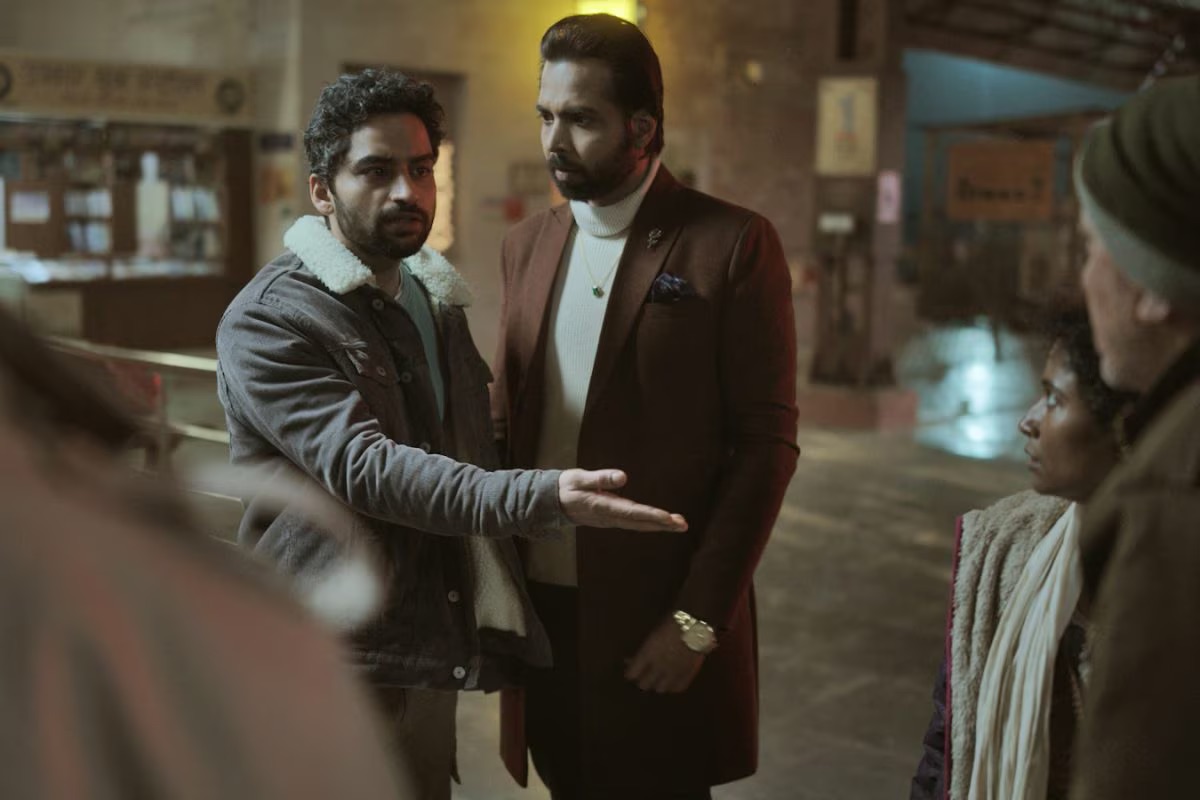
Soumalya: Her research really came through in the character. I’ve spent 25 years of my life with this community, and I have many close friends and acquaintances among them. I must say, Jhumpa’s dialogues in ‘Stolen’ felt incredibly apt. That’s why I felt such a personal connection with the character.
Karan: We used to call Mia’s friends from Purulia before shooting and rehearse the dialogues with them. Sometimes, if we needed to change a line or two, we’d call them directly from the set to verify the lines and the dialect.
Soumalya: That’s really interesting. And Abhishek, I think you’re quite familiar with this community since you’re from Kharagpur?
Abhishek: Yes, yes—but you see, I don’t have much experience interacting with them.
Soumalya: Alright, let’s move on to the next question. I came across one of your interviews where you all discussed how the distribution system often coerces filmmakers into cutting their films, and how film festival circuits tend to prefer films with shorter runtimes. Anurag Kashyap has also spoken about this issue. Could you elaborate on this issue a bit more? And did you face this challenge while making ‘Stolen’?
Also Read: The 10 Best Indian Movies of 2025 (So Far)
Karan: I don’t think we ever said it was a problem.
Abhishek: Yeah…
Gaurav: Yeah, it’s not a problem. It is actually designed like that. You don’t really face this issue at the festivals, but after the festivals. See, festivals are about showcasing the film, approaching distributors, and creating buzz through media. The real challenge begins with the theatrical release. There are always limited slots in theatres. Let me give you an example: no one watches films from midnight to early morning in the theatres. Right? Now imagine your film is scheduled for a 10 PM slot and runs for 2.5 hours. Naturally, it’s going to get fewer shows. Theatres also need time between screenings to clean and manage logistics. So, shorter runtimes earn the privilege of more slots.
When I produced “Angry Indian Goddesses” (2015) and ‘Faith Connections’ (2013), the distributors came to me and said, ‘We want to buy your film, but the runtime has to be under 105 minutes.’ That’s just how the theatrical business works. On top of that, audience attention spans are shifting. Even on OTT platforms, the next film starts rolling before the credits of the last one is done. The business of these platforms is based on the retention of your attention.
So, unless the material demands a longer runtime to unfold its substance, there’s no real point in extending the runtime. In our case, with Stolen, we knew from the start that it wouldn’t go beyond two hours. The screenplay, the action, even the locations—all were designed with that in mind. It wasn’t a compromise. It felt organic. But yes, theatrical structures do create limitations that some films confront.
Karan: Yeah, it depends on the material.
Abhishek: Soumalya, no one decides the runtime before making a film. It’s only once the film is finished, when it comes out of the editing room, that we get to know its runtime. I don’t think a filmmaker really thinks in terms of runtime anyway. In our case, we just wanted to make a ‘Tight’ film.
Soumalya: I understand. I just wanted to know if someone is making a 200-minute film, and there’s external pressure coercing him/her to cut down the original length…
Abhishek: Yeah, but no one will force you to do that. Theatres don’t come to producers demanding films with shorter runtimes. It depends on the film crew. There’s no rule like that. ‘Stree 2’ (2024) had a long runtime, and see, it still became a superhit.
Soumalya: Alright! So, let’s move on to our last question. Before we end this, we always ask our guests about their five favorite films, but since we’re called “High on Films,” could you share some movies that you believe represent the cinematic high moments, where you feel cinema truly reached its peak? What films made you feel that way?
Abhishek: “Pather Panchali” (1955). It’s a must-watch for every Indian. It’s the most beautiful film I’ve ever seen. Then I’d name “Ganga Jumna” (1961). I truly believe you’ll understand India much better if you watch films from the 1950s and ’60s. Back then, cinema was rooted in rural India, and somewhere in the ’70s, that rural narrative began to fade. Those earlier films captured the essence of Indian identity. You can show them internationally to offer a deeper understanding of our country. Next, I’d name “Garm Hava” (1973). Every aspiring actor should watch Balraj Sahni’s performance in it. Sahni was one of the most subtle actors we ever had. Then “Deewaar” (1975)—partly because I’m a Bachchan fan, and also because of the brilliance of Yash Chopra. And then “Schindler’s List” (1993). Then … Actually, I’m going year by year now.
Soumalya: You’ve already recommended five films, but if you’d like to recommend more, please go ahead.
Abhishek: [Chuckles] No, no! Not anymore…
Karan: I’ve already mentioned the three films that inspired me to make “Stolen”—they were truly amazing. Now, I’d like to recommend two more Indian films: “Ardh Satya” (1983) and “Salaam Bombay!” (1988).
Gaurav: I’ll pick some Indian films, and a few from outside India as well. First is “Satya” (1998)—it left a deep impact on me, and I aspire to tell stories in that manner. Then there’s “Rang De Basanti” (2006), which also influenced me deeply. Next, “Jaane Bhi Do Yaaro” (1983)—a true masterpiece. From outside India, I’d recommend “Babel” (2006) and “Se7en” (1995).
Soumalya: Thank you, everyone. It’s been a real pleasure talking to you.


